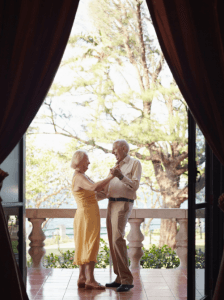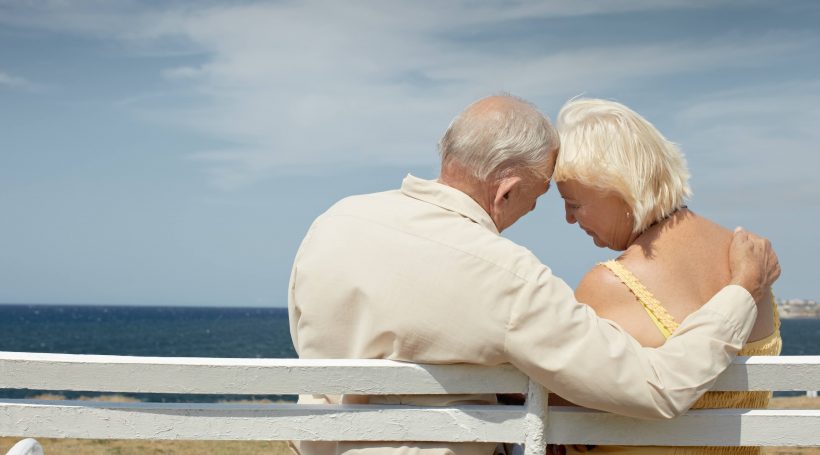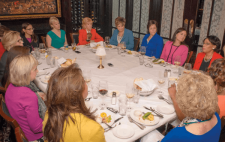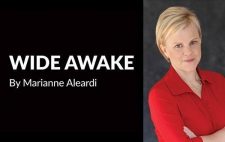Suzanne loves her husband, Gregory, and will continue to take care of him as she has since he was diagnosed with MS and began experiencing neurological issues some 20 years ago. She also loves Michael, who is her companion. Although still married to Gregory – her husband of 23 years – Suzanne now shares an intimate and loving relationship with Michael.
Ron took care of his ill wife at home for 25 years, until she had to live in a nursing home, where she eventually died. He loved her and grieved for her, but he also had a relationship with another woman for two years before his wife’s death. Ron says his new partner understands his pain and loneliness. They are still together.
In the ceremony of marriage we say “until death do us part.” We vow to be there in sickness and in health. But as a society, we are living longer, thus prolonging the lives of those with long-term illnesses. More than five million Americans have been diagnosed with Alzheimer’s and dementia. Countless adults live with the later stages of multiple sclerosis, and the Centers for Disease Control and Prevention estimates that more than 1.5 million Americans sustain traumatic brain injuries each year. Behind many of these patients there is a spouse who has been thrust into the role of caretaker.
Retired Supreme Court Associate Justice Sandra Day O’Connor has spoken about how her late husband, who suffered from Alzheimer’s and spent his last years in an assisted-care facility, became involved with a woman patient who was his close companion. When her husband was moved to a different building, she told a New York Times reporter, he found another lady friend. “I’m totally glad,” she told the paper.
This paradigm of long-term caregiving and an aging population with lingering illnesses and a higher life expectancy have made some spouses, care workers and clergy members re-think the fundamental definitions of marriage and adultery. What might seem unacceptable in most situations – a woman with an ill husband accepting that he holds hands and gives a kiss to another woman in the nursing home or a man with a wife who no longer knows him having an intimate relationship with another woman – becomes a moral dilemma that many refuse to judge harshly.
“Exhaustion, loneliness, a sense of abandonment, a feeling like nobody else understands what they are going through – that is what I hear,” says Bill Getman, senior pastor at First Presbyterian Church in Haddonfield. Getman has counseled many spouses in his 35 years as a pastor in SJ. “They wish they didn’t have the responsibility, and they feel guilty for feeling that way.”
 Suzanne, 56, cared for her husband at home until he went into a nursing home in 2011. Stress and loneliness were taking their toll, along with disappointment that she could not go on providing his care. The hardest part, she says, “is the guilt I have that I can’t take care of him and be there for him like I should. I’ve lost my husband. I’ve mourned him over the years.” She visits her husband four times a week and tries to keep him as healthy and happy as possible. Her relationship with Michael helps sustain her and is her lifeline. “Do I think this is right? No. But if I don’t take care of myself, who will take care of my husband?”
Suzanne, 56, cared for her husband at home until he went into a nursing home in 2011. Stress and loneliness were taking their toll, along with disappointment that she could not go on providing his care. The hardest part, she says, “is the guilt I have that I can’t take care of him and be there for him like I should. I’ve lost my husband. I’ve mourned him over the years.” She visits her husband four times a week and tries to keep him as healthy and happy as possible. Her relationship with Michael helps sustain her and is her lifeline. “Do I think this is right? No. But if I don’t take care of myself, who will take care of my husband?”
Rabbi Richard Address, senior rabbi of Congregation M’Kor Shalom in Cherry Hill, has been discussing these quandaries for more than a decade as he speaks about aging to groups across the country and on the radio. He also authored the book “Seekers of Meaning – Baby Boomers, Judaism and the Pursuit of Healthy Aging.”
Address still remembers a workshop he was giving 10 years ago in Jackson, Miss. He raised the issue of spouses who seek out another companion in these situations. The room became very quiet. Then someone asked how you continue to represent the “sanctity of marriage” and allow these relationships. Half the crowd agreed. But another person said she understood what the rabbi was saying and questioned how people could be quick to judge when they hadn’t been in these situations. The other half of the room agreed with that concept.
“Given the realities of extended life spans and the unique frightening aspects of these cases, do we now need to look at redefining such terms as adultery?” Address writes in his book. “Is there a need for a document that recognizes the horrible and tragic circumstances of a person being afflicted by a long bout of dementia or Alzheimer’s disease and gives permission for the spouse to seek physical or emotional and spiritual companionship outside the marital relationship?”
Many who have been long-term caregivers or have counseled them say they would not judge someone who is ill or well who seeks a relationship out of the isolation and loneliness that comes with these diseases.
“It is a very stressful life that I have,” says 80-year-old John, whose wife has been ill since 1993 and now lives in a nursing home. He has a companion he met several years ago. “I was very much alone even though my wife and I lived together. I love my wife, but the nature of that love has morphed into something else. It’s not a romantic partnership. I was very stressed and very depressed before. I’m happy now that I have a physical relationship and I value the emotional support. It has improved my life a great deal. For traditionalists set in the ways of ‘til death do us part,’ it might be offensive.”
More than 100 husbands and wives in New Jersey and 1,000 nationwide find support through the Well Spouse Association (WSA), which has a branch in Cherry Hill. The organization, founded in 1988, has support groups and an annual convention for those caring for spouses long-term. This year’s annual WSA meeting will be held in Philadelphia in October. Donna McQuade, who runs the Freehold support group, joined 17 years ago. She has been her husband’s caregiver since he had a serious accident 30 years ago.
“You have to walk in our shoes to understand,” she says. “People don’t get it at all. Having this support group has been huge in my life. The motto of our organization is ‘when one is sick, two need help.’”
While McQuade has never had an intimate relationship outside her marriage, she understands when people make that choice. “It is necessary for some people, and it helps them,” she says. “Everyone has to deal with this in their own way. We do not judge. Everyone’s situation is different in the trenches of caregiving. We strive for sanity, not sainthood.”
Katie Young, program director at CareOne Harmony Village in Moorestown, a residence for people with Alzheimer’s, dementia and other memory loss illnesses, has seen the pain faced by spouses and other families in the 15 years she has worked in the field of aging. “It’s a double whammy in a lot of ways,” she says. “You have the loss, but they are still there physically. You have to come to terms with a new reality.” And sometimes, that reality includes accepting that the person with memory loss becomes attached to another man or woman and looks at that person as a spouse or close companion.
Young tries to help families understand that it is not “a betrayal” when a loved one holds hands with someone else. “Those who have had good relationships are trying to replace what they have had,” she says. The basic human need for comfort, love and companionship does not leave someone, even if they can’t remember the life they had before the illness. Young has seen cases where the patient calls the new partner the name of the spouse. “In general, they are replicating a positive relationship,” she says. “They crave the relationship they had before. There are so many losses, but what hangs on to the bitter end are the emotional reactions.”
It is often the adult children of the person who is ill or the children of the caregiver who struggle most with the idea of their parent finding another person. Both Address and Getman have counseled families in these situations over the years. “I try to encourage them to understand how very lonely their mother or father is and try to get them to look at it from their perspective,” says Getman. “I say I understand what loneliness causes us to do sometimes, and far be it for me to judge that person.”
Sometimes Address is asked why he brings up this issue when discussing the tribulations of aging, illnesses and caretaking. He makes it part of the discussions even though he understands it is a difficult and painful subject.
“This is a gray area, it’s all very gray,” Address says. “I am raising the issue because so many people are living it.”
We have changed the names of those referred to by first name only in order to protect their privacy.
Help for Caregivers:
Rabbi Address’ Sacred Aging: jewishsacredaging.com. Address also has a radio show on Baby Boomer issues at 10 am on Tuesdays on WWDB-AM (860).
Well Spouse Association: wellspouse.org
The Alzheimer’s Association: alz.org














